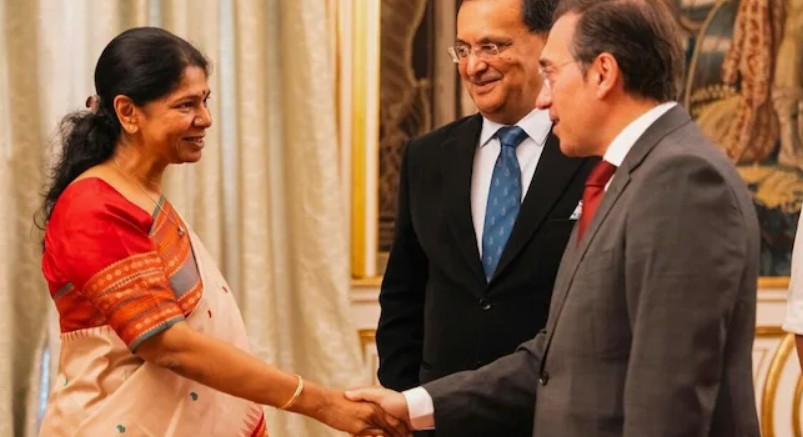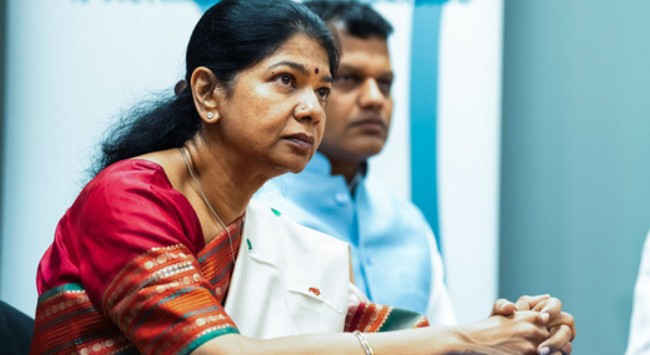In an interaction that resonated deeply with the principles of cultural diplomacy and linguistic respect, Kanimozhi Karunanidhi, the articulate and influential Member of Parliament from the Dravida Munnetra Kazhagam (DMK) party, recently delivered a powerfully nuanced and widely applauded response when posed a seemingly simple question about India’s ‘national language’ during her visit to Spain. Her reply, delivered with clarity and conviction, not only dispelled a common international misconception but also eloquently underscored India’s rich tapestry of linguistic diversity, a concept often misunderstood beyond its borders.
Kanimozhi was in Spain as part of a high-profile Indian parliamentary delegation participating in a cultural exchange program aimed at strengthening bilateral ties and fostering a deeper understanding of India’s multifaceted heritage. Known for her strong advocacy for Tamil language and culture, and as a vocal critic of any perceived attempts at Hindi imposition, Kanimozhi’s presence lent particular weight to discussions on India’s linguistic landscape. During a question-and-answer session following a presentation on India’s democratic framework at a prestigious academic institution in Madrid, a Spanish scholar, genuinely curious, inquired about “the national language of India” – a question often asked by those accustomed to the linguistic homogeneity of many European nation-states.
The atmosphere in the room, filled with academics, students, and diplomatic observers, momentarily shifted with the directness of the question. It touched upon a sensitive nerve in India’s domestic political discourse, particularly in the southern states. Kanimozhi, however, received the query with a calm demeanor, recognizing it as an opportunity to educate rather than confront. Her reply, delivered in fluent English, was both precise and profound.
“India, contrary to what some might assume, does not have a single national language,” Kanimozhi stated, her voice clear and measured. “Our Constitution recognizes 22 official languages, each with its own rich history, literature, and cultural significance. Hindi, alongside English, serves as an official language of the Union for administrative purposes, but it is not the sole national language of our diverse nation.” She elaborated further, emphasizing that this linguistic pluralism is not a weakness but a fundamental pillar of India’s strength and identity, a testament to its unity in diversity. She spoke of the vibrant literary traditions of languages like Bengali, Kannada, Malayalam, Telugu, and particularly focused on Tamil, her mother tongue, highlighting its status as one of the world’s oldest living languages with a classical heritage that predates many others.

The parliamentarian underscored that this linguistic diversity is cherished and protected, reflective of India’s federal structure where states are organized largely along linguistic lines, allowing for the flourishing of distinct cultural identities. She argued that respecting and promoting all of India’s languages is essential for nurturing the nation’s democratic ethos and ensuring that every citizen feels represented and valued. Her response was a masterful blend of constitutional fact, cultural pride, and diplomatic grace, clearly articulating India’s unique linguistic mosaic without descending into internal political rhetoric. The clarity, confidence, and respect with which she delivered her answer resonated deeply with the international audience, culminating in a spontaneous and sustained round of applause that filled the hall.
The issue of a “national language” has been a point of contention in India since its independence. While the Constitution designated Hindi in Devanagari script as the official language of the Union, alongside English for official purposes, it deliberately avoided declaring any single language as the “national language.” This delicate compromise was born out of the anti-Hindi agitations, particularly powerful movements in states like Tamil Nadu, which feared the imposition of Hindi would marginalize regional languages and identities. The DMK, deeply rooted in the Dravidian movement, has historically championed the cause of Tamil language rights and resisted any moves to elevate Hindi above other regional languages. For Kanimozhi, as a prominent DMK leader and a poet herself, articulating this stance on an international platform was not just a political duty but a deeply personal conviction.
Her reply in Spain also served as a subtle but firm counter to persistent, albeit often unintentional, portrayals of Hindi as the sole representative language of India, which can sometimes occur in global contexts. Such portrayals inadvertently erase the linguistic richness of a subcontinent home to languages with millions of speakers each, many older and distinct from Hindi. By clarifying India’s constitutional position and celebrating its linguistic pluralism, Kanimozhi effectively acted as an ambassador for India’s true, diverse linguistic identity, correcting a common misconception on the world stage.
The applause Kanimozhi received in Spain was more than just a polite acknowledgement; it was an affirmation of her articulate defense of India’s pluralistic character. It signaled that her nuanced explanation of India’s linguistic policies resonated with an international audience that values diversity and self-determination. This incident underscored the power of “soft diplomacy,” where cultural exchange and personal interactions can convey complex national realities more effectively than formal political statements.
Domestically, Kanimozhi’s response garnered significant attention and praise, particularly in Tamil Nadu and among other linguistic groups that feel their languages are under threat from the perceived promotion of Hindi by the central government. Her firm yet respectful articulation of India’s linguistic diversity on a global stage was seen as a validation of their long-standing linguistic rights. It reinforced the DMK’s ideological stance and provided a moment of pride for those who champion India’s linguistic federalism. In a country where language often intersects deeply with identity and politics, Kanimozhi’s clear statement served as a powerful reminder of the nation’s commitment to embracing its multifaceted linguistic heritage.
Ultimately, the incident in Spain transcended a simple question and answer. It became a moment where a prominent voice from India’s South confidently asserted the nation’s constitutional ethos of linguistic equality and diversity on a global platform, winning not just applause from an international audience, but also reinforcing a vital message of unity in diversity back home. It was a testament to the enduring strength of India’s pluralism, eloquently articulated by one of its most ardent champions.


